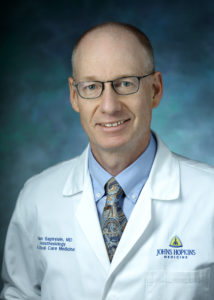 Adam Sapirstein, MD
Adam Sapirstein, MD
Department of Anesthesiology and Critical Care Medicine
Johns Hopkins Medicine
1800 Orleans Street
Bloomberg Children’s Center Suite 6302
Baltimore, MD 21287
410.955.8408
Dr. Adam Sapirstein is an associate professor of anesthesiology and critical care medicine and an assistant professor of surgery at the Johns Hopkins University School of Medicine. His area of clinical expertise is adult critical care and is on faculty at the Armstrong Institute for Patient Safety and Quality.
Dr. Sapirstein received his medical degree from Pennsylvania State University College of Medicine and completed a residency in anesthesiology at Massachusetts General Hospital. He also performed a fellowship in anesthesiology and critical care medicine at Massachusetts General Hospital. He is a member of the American Society of Anesthesiologists, the American Association for the Advancement of Science, the Society for Neuroscience and the Society for Critical Care Medicine.
With stroke a major cause of ICU admissions and hospital mortality, Dr. Sapirstein focuses his research on the role of phospholipases A2and their lipid metabolites in brain injury. He and his group are evaluating the role of the cytosolic, Group V, and Group X PLA2s in models of stroke and excitotoxicity and are investigating the function of PLA2s in cerebrovascular regulation. Both areas of research are conducted with in vivo and in vitro models.
Dr. Sapirstein and his colleagues believe that inhibitors of the PLA2 enzymes are likely to have several important clinical uses. (Major pharmaceutical companies are currently developing and trialing such drugs.) They are particularly excited by their discovery that cPLA2 is essential for the early electrophysiologic changes that occur in hippocampal CA1 neurons following exposure to N-methyl-d-aspartate (NMDA) (Shen Y, Kishimoto K, Linden, DJ, Sapirstein A. Cytosolic phospholipase A2 alpha mediates electrophysiologic responses of hippocampal pyramidal neurons to neurotoxic NMDA treatment. Proc Natl Acad Sci U S A 104:6078, 2007), a finding that has profound implications regarding the possible uses of selective cPLA2 inhibitors following acute neurologic injury. Although they are working with models of stroke in mice, their findings may be broadly applicable to a variety of neurologic disorders. PLA2s also have been implicated in the pathogenesis of aspiration lung injury during general anesthesia and in reactive airway responses.
In the long term, Dr. Sapirstein hopes to establish the potential for clinical inhibition of PLA2enzymes in the treatment of acute and chronic neurologic diseases and injuries. He also hopes to use in vivo imaging and lipid analysis to delineate specific roles for lipid species in modulating excitotoxicity and cerebrovascular responses.
Professional Activities
- American Society of Anesthesiologists
- American Association for the Advancement of Science
- Society for Neuroscience
- Society for Critical Care Medicine
Selected Publications
- Ahmad M, Saleem S, Zhuang H, Ahmad AS, Echeverria V, Sapirstein A, Doré, S. 1-hydroxyPGE1 reduces infarction volume in mouse transient cerebral ischemia. Eur J Neurosci 23(1):35–42, 2006.
- Wu CL, Sapirstein A, Herbert R, Rowlingson AJ, Michaels RK, Petrovic MA, Fleisher LA. Effect of postoperative epidural analgesia on morbidity and mortality after lung resection in Medicare patients. J Clin Anesth 18(7):515–20, 2006.
- Brady KM, Texel SJ, Kishimoto K, Koehler RJ, Sapirstein A. Cytosolic phospholipase A2alpha modulates NMDA neurotoxicity in mouse hippocampal cultures. Eur J Neurosci 24(12):3381–6, 2006.
- Shen Y, Kishimoto K, Linden, DJ, Sapirstein A. Cytosolic phospholipase A2 alpha mediates electrophysiologic responses of hippocampal pyramidal neurons to neurotoxic NMDA treatment. Proc Natl Acad Sci U S A 104:6078, 2007.
Laboratory Members/Key Associates
Faculty/Research Associates/Instructors
Jian Zhang, PhD
Collaborators
David J. Linden, PhD
Takao Shimizu, MD, PhD
Sylvain Dore, PhD
Raymond Koehler, PhD
Joseph V. Bonventre, MD, PhD
Kwang Sik Kim, MD
Honors
Fellow, Japanese Society for Promotion of Science (2002)